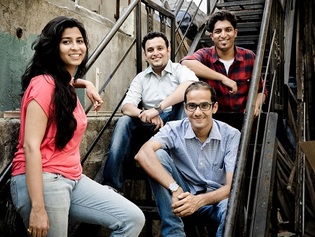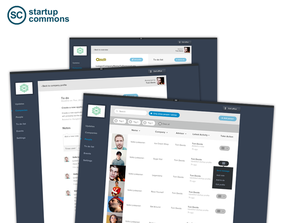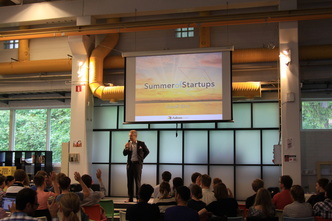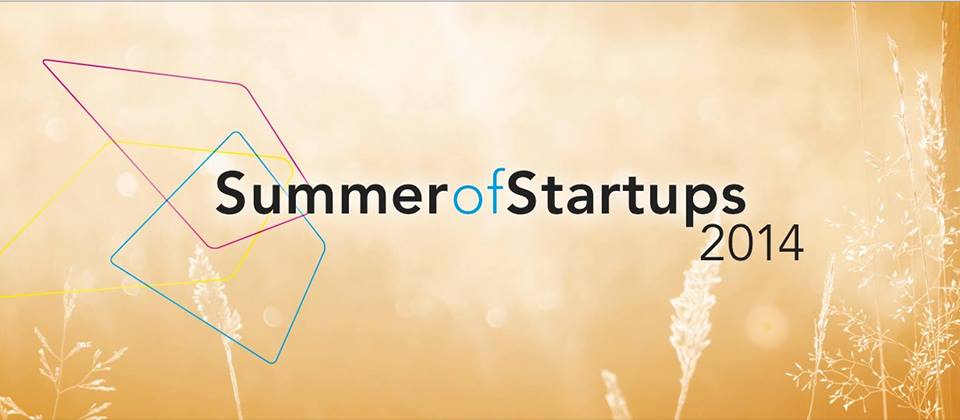|
A growing number of ambitions entrepreneurial - minded individual and a great pool of technical specialists results into the growing number of incubators and accelerators in Ukraine.
Incubators in Ukraine mainly, provide consulting services and help to present the project to the investor. Sometimes, they also provide future office space and organize educational activities. In some cases, also startups are offered small investment. Incubators, focused exclusively on consulting usually do not push strict rules for selecting projects. Any entrepreneur or team with an idea and a desire to make it happen can become a resident of the incubator. As for accelerators, they work individually with the project, which has passed the competition, attracting financial resources and experienced mentors. Their main objective is to share knowledge with startups for a limited period of time and create an attractive product at a working version or prototype. Often these projects have subsequently received venture capital funding from foundations, working directly with the accelerator. Let's have a closer look at some of the accelerators and incubators in Ukraine and interesting fact about them. 1. GrowthUP (Kiev) GrowthUP is the first Ukrainian accelerator dedicated to technology startups that works with projects from the earliest stages of development. The accelerator was established in 2008 at the consulting-firm BayView Innovations, a subsidiary of the BVU Group. What is interesting about their program: More than 300 mentors from Europe and the United States are mentoring projects (around 75%5 of them from C-level). The accelerator program is 4 months and including one month in Berlin and one month in Silicon Valley visits, meeting with mentors and access to the network. Possible to get see fund up to 50 000 $ from the GrowthUP+ fund. Costs: at the final stage successful startup offer 5% equity stake Results: More than 350 startups completed the acceleration program, more than 3,000 people attended seminars, and graduates raised more than $ 3 million of seed- and $ 45 million in Series A and B financing. 2. Polyteco (Kiev) Business Incubator Polyteco is based at the National Technical University of Ukraine. Youth IT Business Incubator "Polyteco" is a project the students' entrepreneurial initiative, the basis of which is formed by progressive ideas in the sphere of IT. Incubator helps to Creation of launch and commercialize new and innovative ideas of students, postgraduates and young scientists from the University in the sphere of IT. What is interesting about the program: It is based in technical park “Kievskaya Polytechnica” and has been established in 2013. After the successful launch startups get a chance to continue working at the park. Startups get office space and meeting with experts. Mentors team includes specialist and professors from the University, as well as, foreign experts. Costs: startup offers 5-20% equity stake to “Kievskaya Polytechnica”, depending on the idea and initial fundings. Results: Around 20 startups are taking part in the program 3. Happy Farm (Shchaslyve village) Founded in 2012, Happy Farm is a business incubator that provides business development services for startup teams (or companies) and also assumes further support and investment attraction in startup companies. The purpose of the business incubator is the search for and commercialization of new technologies and developments in the sphere of information technology. What is interesting about the program: The incubator offers a 2 month program, including 2 months in the United States. It is also possible to stay for additional 2 month for the post-development stage. Startups are offered day-to-day mentorship program. Mentors are serial entrepreneurs and world-class experts, examples: Bob Dorf (Co-author of the bestseller “The startups Owner’s Manual”), Mervin Liao (mentor of 500 Startups), Kristoffer Lawson (Co-founder of HOLVI), Madeline Duva (Advisor to Eye-Fi and mentor at the FOunder Institute). The program includes funding of 70 000 $ (15 000$ in cash and 55 000$ in services). Costs: Happy Farm gets 15% equity stake for the services Results: More than 30 startups are taking part in the program  It has been three years building Hammer and Mop, and it seems like one long arduous trek- eventful and full of valuable lessons. There have been times when my limbs threatened to give up, but a look at the distant peak usually set things right again. Last year, it felt good completing two years out in the cold. We have now reached the base camp. There are some things I’ve learnt and thought it worthwhile to share: It’s all about people I cannot stress this enough. Right from the day I decided to start off on this trek, till the day I pitched my tent at the base of this peak I have been helped, advised, counselled by people with whom I share a genuine relationship that is mutually beneficial. Customers are people who you need to communicate with. Allies are people who need to get value out of an association. Team members are people who need to feel respected and a part of the game. Your family — with their unconditional love — only fear for your sanity. You are a human and you need to love yourself. It’s all about information Today, we are a team of individuals following certain processes and believing in certain ideas day after day. At all levels, our focus is hiring leaders who can grow with the company by lending their shoulders to the task. Distilling the broad vision to profile specific short term goals has helped us perk up performance and boost accountability. A team supervisor focuses only on cleanup quality, communications focuses only on information flow, and so on. Our mentors and well wishers help us keep a holistic perspective. While the team is a submarine working hard at being submerged, our mentors provide the periscope. It’s all about your team We are crazy about the peak and take lead to manage aspects while figuring out the way through the jungle. I didn’t know what to expect out of ‘employees’ three years back and my errors cost me my entire team once. Proper policies, complementary skills, mutual respect, clear communication and a healthy work environment play a big role. Most of my team consists of blue collar workers. The vicious circle of managing them is a misconception, because respect has to be earned. I have learned that everyone likes the peak, and is keen to play a well defined role in a performing team. Things fall apart if clarity is lost. In a jungle, we have realized that we need to have each other’s back and that has helped us keep going. It’s all about your customers And they are loveable humans too. Their expectations are pretty simple, and they pay, so keeping them happy is key to a successful business. They understand goof ups, empathise and offer support. Customers seek an honest relationship and are generous with compliments if things go well. They are generous with critical feedback if things don’t. I have been fortunate to have numerous patrons who have held our hands throughout, helping us get better at what we do. Negotiations have seldom been about money, they almost always transcend to intangibles if the game is played right. Customers seek trust, which is built by consistent service. Being open and apologetic about our weaknesses has helped us live. It’s all about money Not at the cost of ethics and quality. You might be in the business to contribute to the society, but you dig your own grave by not being focused on cash flow and profits. Money is the essential grease, profits can be reinvested for growth, healthy cash flow provides you with bandwidth to make your customers happier. An organisation needs to sustain itself and its people, and that’s why it needs to earn money. To ensure the same, for a young company like ours, that’s the CEO’s job. It’s not about the comfort zone At the start, I remember my co-founder urging me to be on the field and find recruits. “Go out and smell the fresh grass, ongoing analysis sitting in the comfort zone isn’t going to make things happen,” he had said. Finding our own spot is a trap, because the proactive explorers win. While it is essential for startup CEOs to know every aspect of the business they run by rolling up the sleeves, it is crucial they ask their senior team members to do the same too. A company won’t grow with leaders sticking to their offices. A company won’t grow without pushing all boundaries. ____________________________________________________________________________________ This is an edited version of a post originally posted at yourstory.com, by Sushrut Munje (Co-Founder of Hammer and MopYou are free to re-edit and repost this in your own blog or other use under Creative Commons Attribution 3.0 License terms, by giving credit with a link to www.startupcommons.org and the original post. Sushrut Munje.  The number of startup communities is growing day by day. Therefore, the demand for an all-in-one tool, which allows to manage effectively and easily those communities, constantly increases. Startup Commons’ Certified Developer Program evolved from an ongoing software development needs and our expanding global customer base. The aim of this program is to develop skilled technicians who understand our platform and startup ecosystems’ challenges. At Startup Commons we aim to build common infrastructure for startups around the world to make the startup journey easier and facilitate active dialog among all stakeholders at the startup scene (such as incubators, accelerators, investor, universities, startups, mentors, business advisors, inventors, VC companies, etc.) The Certified Developer Program aim to attract skilled and innovative developers to the startup ecosystems’ field, to ensure that more and more startups ecosystems emerge at every corner of the world. We are building a pool of talented developers to provide effective and innovative solutions for our clients. The goal of the program is to ensure that our Certified Developer Partners have the skills required to provide excellent service to our customers worldwide, in both quality of work and communication skills. We believe that the program gives a chance to our in-house developers to fully focus on building the best product, while our certified developers help to build customized solutions. This approach gives our customers access to developers who understand our platform and can perform specific requests for them, without having to go through us each time. During the certification process developers get hands-on training on the functionality of the platform, learn about the roles of different users, different feature, basic software architecture and go through specific development projects. Moreover, developers are working closely with our existing in-house team what learn more about our customer and their needs, and the solutions and services we provide to overcome challenges and support startups in the most cost effective and transparent way. Our Certified Developer Program is open to development companies, UX&UI designer, individual back-end & front-end developers. It is our pleasure to introduce you to a handful of the development companies, who has accomplished our program and are committed to provide the best service to our customers: ChangeLab23, Sunrise Software Solution, Twelve & Six, Justcoded. We believe that in a long term our Certified partners who understand the startup ecosystem model, have the necessary technical skills and competences, will help us to shape the way startup communities are managed. We believe that our Certified Developer Program will serve the interest of our customers, developers and many startup ecosystems. To become our Certified Developer Program, click here and get started. Make no mistake about it. Silicon Valley is expensive. Actually, it’s very expensive. But if you’ve ever spent any time in the Valley then you already knew that. For those on the outside, then you can believe that rumors surrounding Silicon Valley’s pricey cost of living are true.
Should you move your business to Silicon Valley? Before you make that decision, here are a few things you should keep in mind? But, just how expensive is Silicon Valley really? Compared to the rest of the country, the cost of living is 87% higher in the Valley than any other American city. When it comes to housing, Silicon Valley is also the most expensive in the U.S. In fact, based on a survey conducted by Coldwell Bankers in its “Luxury Market Report 2014,” Woodside, CA is the nation’s top luxury market. Woodside wasn’t the only town located in Silicon Valley to crack the top five. Portola Valley was third, with Hillsborough coming in at number four. So, if you wanted to relocate to Woodside, expect to spend $949,000 on a two bedroom house with one bathroom and a fireplace – this for the record was the cheapest listed house in Woodside. Trulia, however, found that the average listing price for homes in Atherton at $9,347,107, which could make it the most expensive city in the country. But what’s a couple million dollars when you’re living in the same area as the guys who founded Google, Larry Ellison, Mark Zuckerberg, George Lucas and Paul Allen? In case you were wondering, there are 71 billionaires who call the Bay Area home, so of course it’s going to be expensive. So what if you’re not a billionaire? Let’s say you’re just you’re a teacher or even an engineer, what’s the price range? The median price for a home is $550,000 in the whole bay area. If you’re looking at San Francisco, it’s around $1.1 Million. And rent? You’re looking at around $3,000 a month for a two-bedroom apartment, which is 76% more than the national average. I personally pay $2,700 a month for my one bedroom in Palo Alto. I had to consider this before I moved my startup to Silicon Valley. To put it another way, if you have a family of four, you would need $90,000 a year to cover rent, food, transportation and childcare. To be more upfront, Silicon Valley is the 7th least affordable housing market for middle class families, San Francisco captured the top spot. Of course, the housing situation isn’t the only major cost in the Silicon Valley. Living in California also means that if you make over $46,776 a year, the state is going to hit you with a 9.3% income tax. Speaking of taxes, whenever you go out and do some shopping, just remember that California has the second highest state and local sales tax rates at 9.08%. Even Hawaii has more favorable sales tax rate at 4.35%. If you look at the ten most expensive cities in regard to sales tax, Fremont and San Francisco are included. As for basic necessities. Silicon Valley is 62% higher than the national average. And gas prices? Both San Jose and San Francisco are included in the ten most expensive cities for gas at over $4 per gallon. Is any of this that big of a concern when you reside in one of the highest paying areas in the country? (Web developers earn $25,000 more than the national average and customer service representatives and lawyers also do well here). Well, it should. Despite Silicon Valley having a reputation for having a higher median income (it was $60,000 in 1993 compared to the $30,000 elsewhere in the country) it’s still a concern if weighing your options on whether or not to live in Silicon Valley. For example, if you made $92,300 a year in the Valley, you would need $74,800 to live that same exact lifestyle in New York City. That’s not saying that you should relocate or never move to the Valley. It’s just bringing up a comparison to give you a better understanding of how pricey, it is to live in Silicon Valley. If you already reside in the Valley, then you already know how expensive it is for housing, gas, food, etc. And hopefully you’ve been fortunate enough to make enough in your salary that you can enjoy the weather and everything else that Silicon Valley has to offer. However, if you’re looking to move to this area because you think it’s magical and can help make your startup a success, you may want to consider other options if money is tight. While it’s an incredible place to work and play, the Valley is really, really expensive. _____________________________________________________________________________________ This is an edited version of a post originally posted at yourstory.com, by John Rampton (President at Adogy), an entrepreneur, full-time computer nerd and startup expert. You are free to re-edit and repost this in your own blog or other use under Creative Commons Attribution 3.0 License terms, by giving credit with a link to www.startupcommons.org and the original post. Currently, there are more than 100 business incubators, accelerators in Russia, which support small companies at their early stages. Many of those incubators are based at Universities or work in close cooperation with the academic world. Typically, startups get consulting services, as well as, office space in incubators. Let's have a closer look at some of the most effective incubators in Russia and some interesting fact about them. Business incubator in Academy of National Economy Incubator was established in 2010 based on the initiative of the rector, Vladimir Mau. What is interesting: Here young entrepreneurs get a chance to meet with top players and experts from different industries, including mentors from Silicon Valley. Startups also get finance to, for example, present their products at the exhibitions, file patent and further research and development. Results: More than 120 startups have been connected to the incubator. Every year seven teams are selected to be residents and boost their startups. Business incubator in Higher School of Economics This business incubator was established in 2006 based on the initiative of the University students and professor Dmitry Repin. What is interesting: Startups have opportunity to get funding from the University, help with PR and marketing, as well as, take part at different exhibitions. Results: Every year 4 to 6 teams become residents of the incubator. However, around 50 startups get possibility to participate in different events. Incubator "Ingria" The incubator was established in 2008 base on initiative of Saint-Petreburg government. It is based in the premises of "Ingria" industrial park in Saint - Petersburg. Moreover, in 2010 the second site of the incubator was established at the State University of Information Technologies, Mechanics and Optics (Saint-Petersburg). What is interesting: The incubator has a space of 2400 m2, what account to 190 workspaces. This high-tech place, where teams are dealing with complicated engineering solutions, biomedicine, etc. Startups get consultations and help with questions such as, intellectual property protection, organisation of production and expert examinations. Results: over the year more than 180 projects has been involved in the incubators activities. More than 40 projects have been residents of the incubator. Investments account to more than 64 million euros (64% - private investments, 36% - public sector). Business incubator in Lomonosov Moscow State University The incubator was established in 2004. The volume of attracted investments - more than 500 million rubles (33 million euros). The market valuation of companies resident and graduate from the Incubator - more than 1 billion rubles (67 million euros). What is interesting: The incubator is supported by the British Council and The Foundation for Assistance to Small Entreprises in Science and Technology. Results: Annually 20 projects are selected for the programme and around 5 of them get further funding for sustainable development in the market. Turnover of resident companies and incubator graduates was more than 100 million rubles (2,2 million euros). Business incubator in Plekhanov Russian University of Economics The incubator was established in 2009 by professors of the University with the support of the Rector, Viktor Grishin. What is interesting: The incubators constantly collaborate with corporate and private investors and industrial parks. It also works closely with incubators of physical and technical institutions. Results: Every year 40-45 projects are being developed in the incubator. 6 startups have been already launched to the market and got profitable. Are you a consultant or an entrepreneur?
- Learn more about Growth Academy Online Training & Certification Programs Download our startup booklet and watch our videos to learn more about our framework to help startups to grow without "reinventing the wheel" and without wasting lot of time trying to connect the dots. The framework is based on the startup development phases and aims to remove the highest universal risks on the startup journey. It is very typical to measure mature of startups ecosystems in terms of new startups, growing startups, investors, investments, exits, etc. and it makes sense as cities use these statistics in the best possible way to communicate their economic growth at high level and to attract other relevant people, investors, big companies, more entrepreneurs and other stakeholders. These indicators are however the result of many smaller activities present in a startup ecosystem that contribute to these higher level results - as any startup ecosystem is the sum of multiple variables of an unbalanced equation inherent to the interactions of the startup ecosystem itself. So, as you can figure out, you need much information to talk about matureness of startups ecosystems. But most of all, you need a good understanding and analysis of your startup ecosystem at different levels and mapping it usually is a good starting point to set up new strategies and achieve a better economic development. But the thing is that properly mapping a startup ecosystem is more than just to create a good map to show who is who in your city or region. It is crucial to work at different levels and in more detail:
We truly believe everyone should work on this model, as it makes the investments to growth and innovation truly visible and measurable - as only the things that can be measured can be improved. And the faster the feedback loop, the faster things can be improved. Actually we are working with this model with few key cities like Helsinki at ecosystem level and even more broadly with independent organizations and we are clearly seeing that it is possible to build a vibrant startup ecosystem in a city in three to five years, what is half or less, compared to known average. Future entrepreneurs and current startups deserve this new scenario that we at Startup Commons are creating and we encourage others to contribute and develop innovation, better, faster and with less resources. Are you a consultant or an entrepreneur? - Learn more about Growth Academy Online Training & Certification Programs Download our startup booklet and watch our videos to learn more about our framework to help startups to grow without "reinventing the wheel" and without wasting lot of time trying to connect the dots. The framework is based on the startup development phases and aims to remove the highest universal risks on the startup journey. This is an originally posted by Óscar Ramírez, CEO Startup Commons. You are free to re-edit and repost this in your own blog or other use under Creative Commons Attribution 3.0 License terms, by giving credit with a link to www.startupcommons.org and the original post
 Summer of Startups is a 9-week full-time program which is targeted for ambitious people to help them get started with their own businesses. Every team get a grant of 5000€ so you team members will be fully focus on the program. Team also get a place to work, coaching and the support of Aalto Entrepreneurship Society's community. Participants get coaching from experienced coaches on a variety of topics. Summer of startups is place to learn, work hard and have fun. This time we talked to Panu Paljakka, Vice President at Aalto Entrepreneurship Society and one of organisers of Summer of Startups. What is Summer of Startups and how has it started? It is 5th time we organise Summer of Startups.So this programme has been started in 2010. Before that there was programme called BootCamp (back in 2009), later on has been separate into Summer of Startup and Startup Sauna. Summer of Startups is a programme for early stage teams, so the criteria to be part of this programme are as simple as, you have an idea and a team. The basic idea behind Summer of Startups is that young people (student and recent graduates) get opportunity to discover what is entrepreneurship, learn more about startups, see if their idea flies (if not, maybe their second or third idea going to work out). So usually we are working with teams at their ideation and concepting stages (learn more here). However there have been few teams with existing prototypes, but it is not our criteria. What is the main goal of Summer of Startups? The goal of the programme is that teams get their prototypes (MVPs) ready by the end of the programme. Our aim is also to educate people and give them opportunity to try what entrepreneurship is. So even if at the end of the programme no business has been establish those people might start company later on (even after 15 years). This is a long term impact of the programme. Who does organise Summer of Startups? Summer of Startups is organised by Aalto Entrepreneurship Society. It is all student-run organisation based in Aalto University (Finland), how ever we have reached a certain level of professionalism. We have coaches who are continuously involved in Summer of Startups and Startup Sauna. What is the main method you use to support participants of Summer of Startups? The most valuable method we use is coaching. There is a bunch of coaches (around 60 this year), who present some ideas on a certain topic (through lecture) or talk about their own story. Some of our coaches deliver workshops or have one-on-one meetings. Moreover, participants get space to work (it is open 24/7) and support of our community (Aalto Entrepreneurship Society, SLUSH, Startup Sauna). In this way it is easy to get in touch with right people. You are based in Espoo and are part of Mentropolitan area (Cities of Vantaa,Helsinki,Espoo). Are there any industry clusters in the startup scene in this area? Population is spread around the country, so there are some industry clusters in different cities (f.e. Turku has good and big gaming scene). Helsinki also has many gaming startups, but there is no focus. I do not know if Helsinki should be focused on specific industries. In his new book, Biz Stone, the Co-founder of Twitter, discusses the power of creativity and how to harness it through stories from his remarkable life and career. Stone is known as the creative, effervescent, funny, charming, positive, optimistic, altruistic and yet remarkably savvy Co-founder of Twitter. His book Things a Little Bird Told Me: Confessions of the Creative Mind spans 224 pages and 18 chapters, and covers the pivotal and personal stories from his life along with lessons earned and learned the hard way.
Born in Boston in 1974, Biz Stone’s first startup was Xanga. He was recruited by Google in the early 2000s, and connected with Blogger founder Evan Williams; the pair later left to work on their own startup Odeo. Twitter was founded in 2007 after a hackathon when the original videocasting product did not pan out as materialised. Twitter’s dizzying global success led to Stone being recognised by ‘Time’ Magazine as one of the most influential persons in the world. His other books include Who Let the Blogs Out? A Hyperconnected Peek at the World of Weblogs. “Creativity is what makes us unique, inspired and fulfilled. This book is about how to tap into the creativity in and around us all,” Stone begins. Here areTop 20 Takeaways from his book, offering insights into creativity, ethics and global vision. 1. Create opportunities, don’t wait for them “Opportunity is manufactured,” says Stone. Don’t wait for circumstances to align your stars, go ahead and make the opportunity yourself. He used this principle even in school days to create a lacrosse team since he was not good in other sports; he also landed his first job as a book cover designer by submitting a cover to the art director even though he was just interning as a delivery boy. 2. Start with an idea Don’t dig into specifics first, start off with an idea. “If you take an idea and just hold it in your head, you unconsciously start to do things that advance you toward that goal,” says Stone. “Have confidence in your ideas before they even exist,” he advises. Sometimes even a sense of desperation that you will eventually get an idea will keep you going. 3. Invest emotionally in your idea “If you don’t love what you are building, if you’re not an avid user yourself, then you will most likely fail even if you are doing everything else right,” says Stone. His startup Odeo did not go too far because he was not into audio podcasts himself, and therefore missed out on important features such as sound quality. Twitter, on the other hand, brought Stone much more joy and excitement. If you are not engaged, you cannot go on, there will be no gravity. 4. Creativity has infinite approaches One thing Stone learnt as a book cover designer is that there are infinite approaches to frame, understand and solve a problem. If one of your creative ideas does not work or does not find acceptance, let go and move on to another one. Don’t take rejection personally. “Creativity is a renewable resource. Challenge yourself every day. Be as creative as you like, as often as you want, because you can never run out. Experience and creativity drive us to make unexpected offbeat connections. It is these non-linear steps that often lead to the greatest work,” explains Stone. He drew on this principle while working at Google – full of PhDs while Stone himself was a college dropout; he advocated a focus on the human aspects of tools and not just technical. 5. Learn to harness constraints for creativity “Constraint inspires creativity,” says Stone, drawing on a number of examples, including his own. Steven Spielberg had a limited budget for the movie Jaws – so instead of creating an expensive replica, he decided to shoot from the ‘shark’s point of view’ – which turned out to be even scarier. Harrison Ford had the runs while shooting The Raiders of the Lost Ark – and instead of dueling a swordfighter in one scene, he just proposed a gunshot – which became an iconic moment in the film. Due to resource constraints, ARM came up with chips which were just not good enough for PCs – but ended up being perfect for cellphones. “Embrace your constraints. They are provocative. They are challenging. They wake you up. They make you more creative. They make you better,” says Stone. Detractors initially said Twitter’s 140 character limit was constraining – but that unleashed a new form of wit and creativity, and power for activists.  StartUp School is HAAGA-HELIA’s program that supports those students who want to found their own business. It offers hands-on assistance and students can also earn credits while doing their own thing. This time we talked with Tommo Koivusalo, StartUp School Program Manager. Tommo's expertise is founding new businesses. He has been involved in founding of five companies, all in different fields of industry, with varying results. In addition to that Tommo has been in management positions in several cases where new businesses have been found inside a company. He is a curious person and willing to develop things. "There is always room for improvement!". What is StartUp School and why did you start it? StartUp School is a support program which is open for everyone who is studying in HAAGA-HELIA University of Applied Sciences. The main reason to start an entrepreneurship program was that for a long period of time HAAGA-HELIA hosted a traditional incubator, which was not gaining good results. It was clear that a different approach has to be taken. And this is why StartUp School has been established. What is the main goal of the StartUp School? The main idea is to provide students with a possibility to start a business while they are studying. We support startups on their Ideation and Concepting stages (more information on stages here). Currently we work with over 200 students and around 25 new business are founded annually. What methodology are you using to support entrepreneurship? We act in a way that students show an interest at first. And then we make sure that the student understands that it is ok to join StartUp School even when he/she does not have a strong idea that he/she is going to be an entrepreneur. This is one message we are trying to send. The second one is: “Just start to do something, even a very small step. Just take the first step". The third one is: "Take responsibility, no one else is going to take it". Helsinki is becoming a hot spot in Europe when comes to entrepreneurship. What is your opinion about the startup ecosystem in Helsinki (what kind of strengths do you see, what is still missing)? Strengths: 1. Finland is the sort of exotic place. If you look at Finnish culture from the Western Europe or Asia this is a very exotic place. We do not see it from here, but if you talk to guys from other countries, they see it that way. 2. Culture. In Finnish system if you agreed on something it will be done without further reminders. It is one of the best things in Finnish culture. And you can trust people here. 3. Finns are good in developing new technologies. 4. Everybody speaks English. 5. High level of education and international approach. Most of Finns have been abroad for long periods of time. They learn about other cultures and get used to work with different people. Weaknesses: 1. Finnish system, where taxation is so heavy that if you take individuals they usually do not have any sort of financial surplus that they might invest. Even if they have a well - paid job, taxes are so high, that they can pay bills but that's it. 2. Most of the funds coming from the public sector, not a private one. But, I think that individuals make better investment decisions. 3. Culture. Finns do like to work alone. They enjoy working independently, working in a group needs some practice. 4. Small market size. Take New York or Silicon Valley, London - market is 10 times bigger compared to Helsinki. But this is something we have to turn into positive: you should go abroad very early or just go global from the very beginning. 5. Legislation regarding bankruptcy. If you end up in bankruptcy in Finland, it is a real disaster. You will be struggling for 10 years to pay back your debts. In the USA you can start from the beginning after 1 year. |
Supporting startup ecosystem development, from entrepreneurship education, to consulting to digital infrastructure for connecting, measuring and international benchmarking.
Subscribe for updates
Startup ecosystem development updates with news, tips and case studies from cities around the world. Join Us?Are you interested to join our global venture to help develop startup ecosystems around the world?
Learn more... Archives
December 2023
Categories
All
|
- Startup Commons
- Business Creators
-
Support Providers
- About Support Providers
- Learn About Startup Ecosystem
- Startup Development Phases
- Providing Support Functions
- Innovation Entrepreneurship Education
- Innovation Entrepreneurship Curriculum
- Growth Academy eLearning Platform
- Certified Trainers
- Become Growth Academy Provider In Your Ecosystem
- Growth Academy Training On-Site By Startup Commons
-
Ecosystem Development
- About Ecosystem Developers
- What Is Startup Ecosystem
- Ecosystem Development
- Ecosystem Development Academy eLearning Platform
- Subscribe to Support Membership
- Ecosystem Operators
- Development Funding
- For Development Financiers
- Startup Ecosystem Maturity
- Case Studies
- Submit Marketplace App Challenge
- Become Ecosystem Operator
- Digital Transformation
- Contact Us
- Startup Commons
- Business Creators
-
Support Providers
- About Support Providers
- Learn About Startup Ecosystem
- Startup Development Phases
- Providing Support Functions
- Innovation Entrepreneurship Education
- Innovation Entrepreneurship Curriculum
- Growth Academy eLearning Platform
- Certified Trainers
- Become Growth Academy Provider In Your Ecosystem
- Growth Academy Training On-Site By Startup Commons
-
Ecosystem Development
- About Ecosystem Developers
- What Is Startup Ecosystem
- Ecosystem Development
- Ecosystem Development Academy eLearning Platform
- Subscribe to Support Membership
- Ecosystem Operators
- Development Funding
- For Development Financiers
- Startup Ecosystem Maturity
- Case Studies
- Submit Marketplace App Challenge
- Become Ecosystem Operator
- Digital Transformation
- Contact Us








 RSS Feed
RSS Feed

